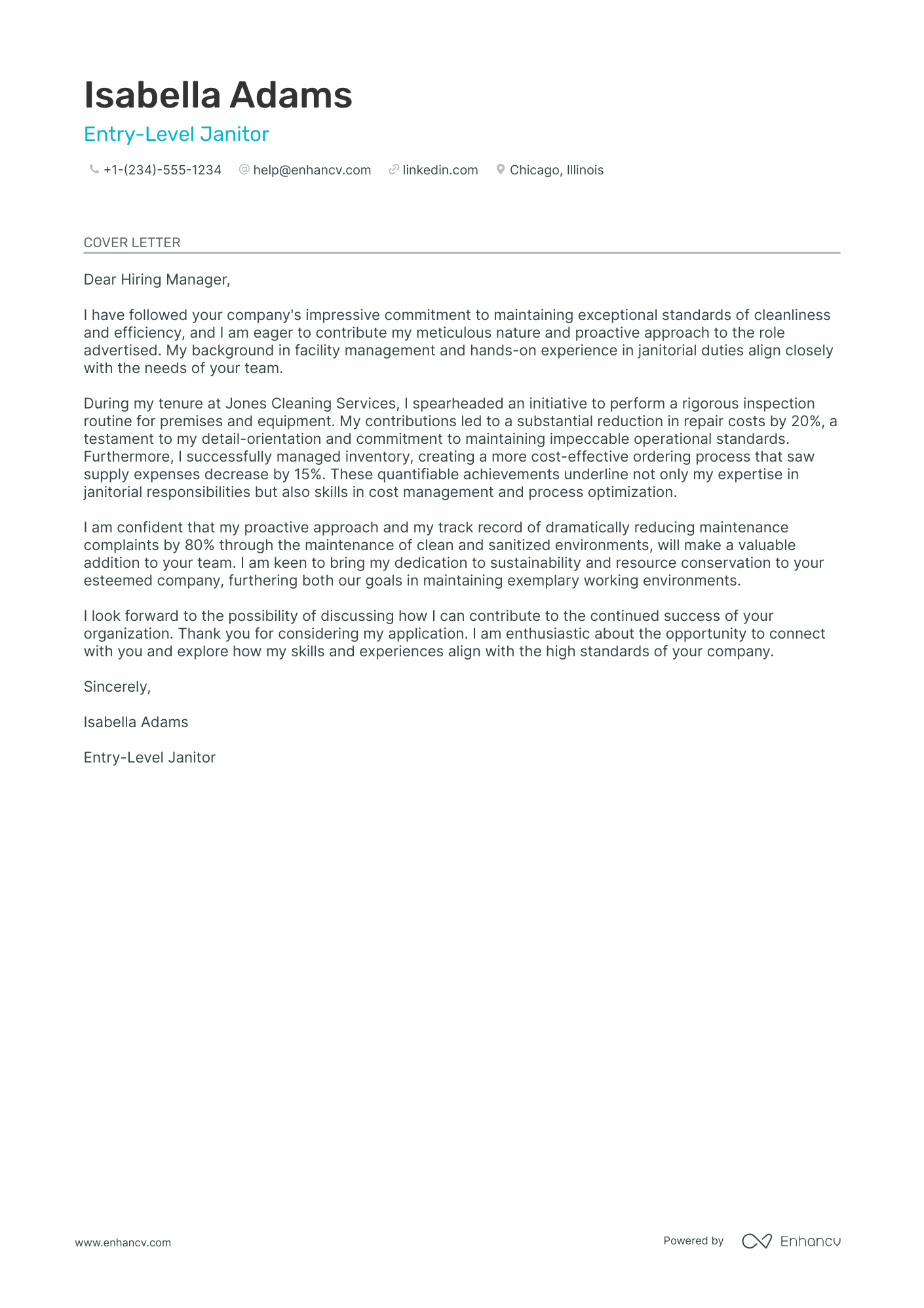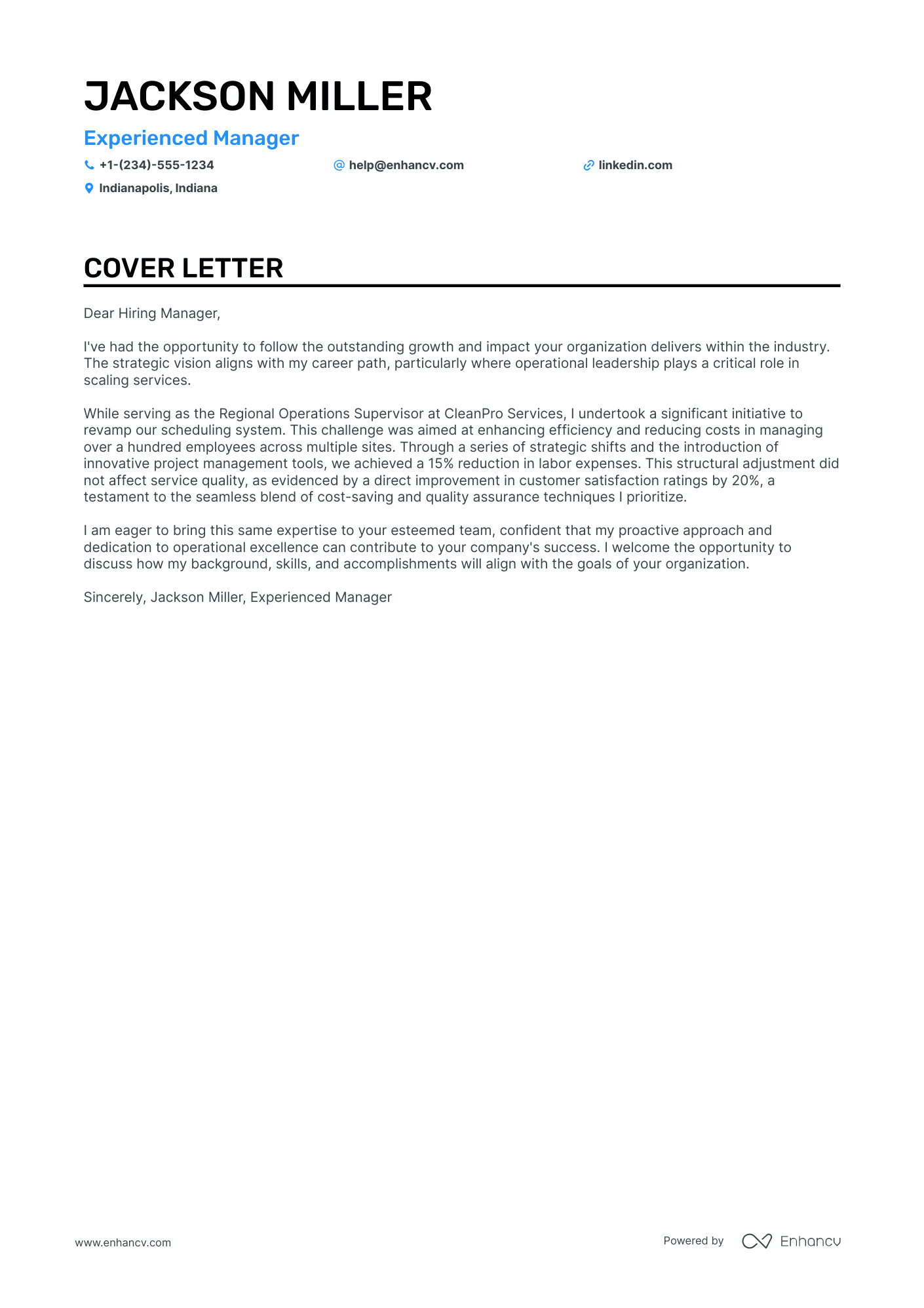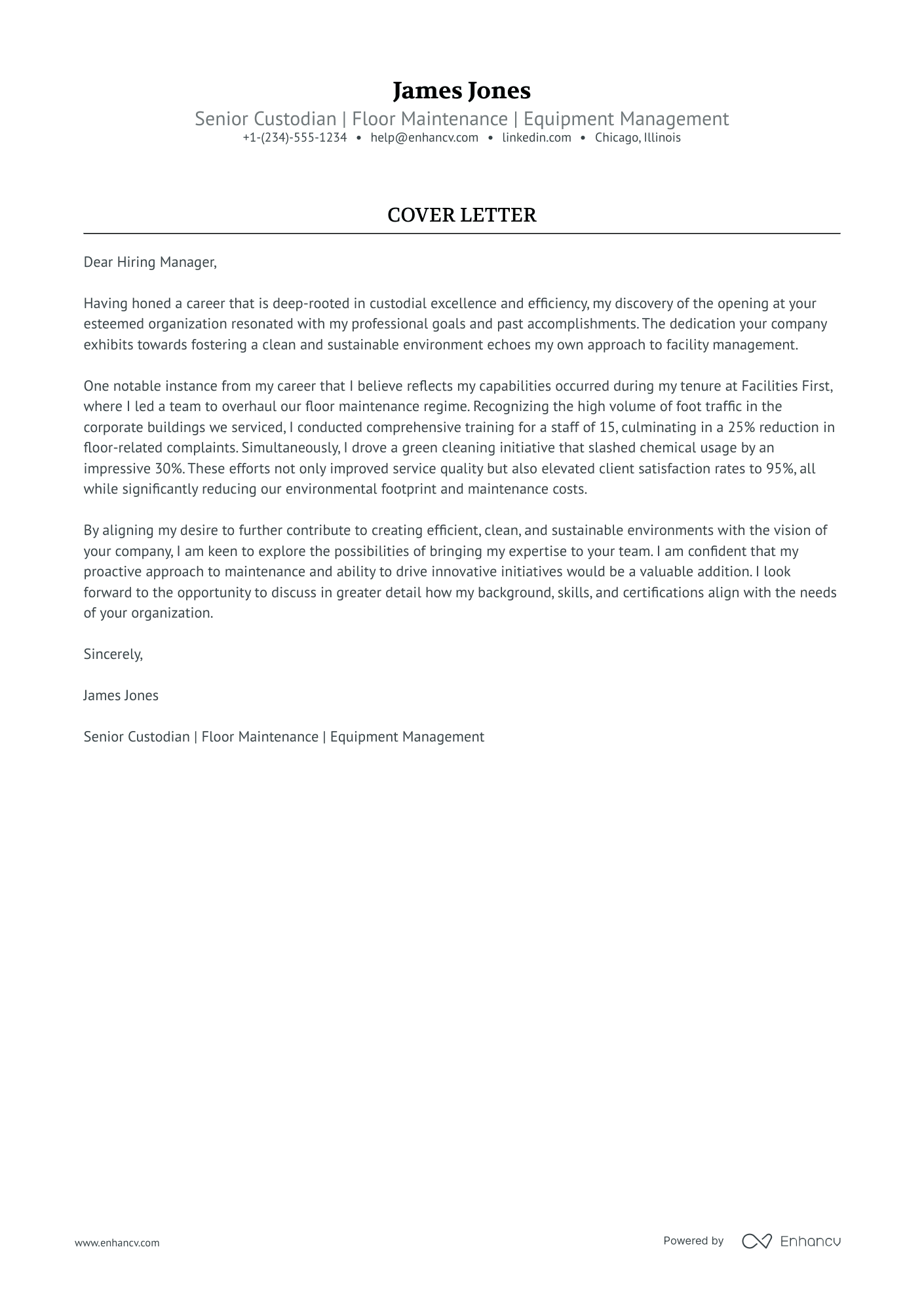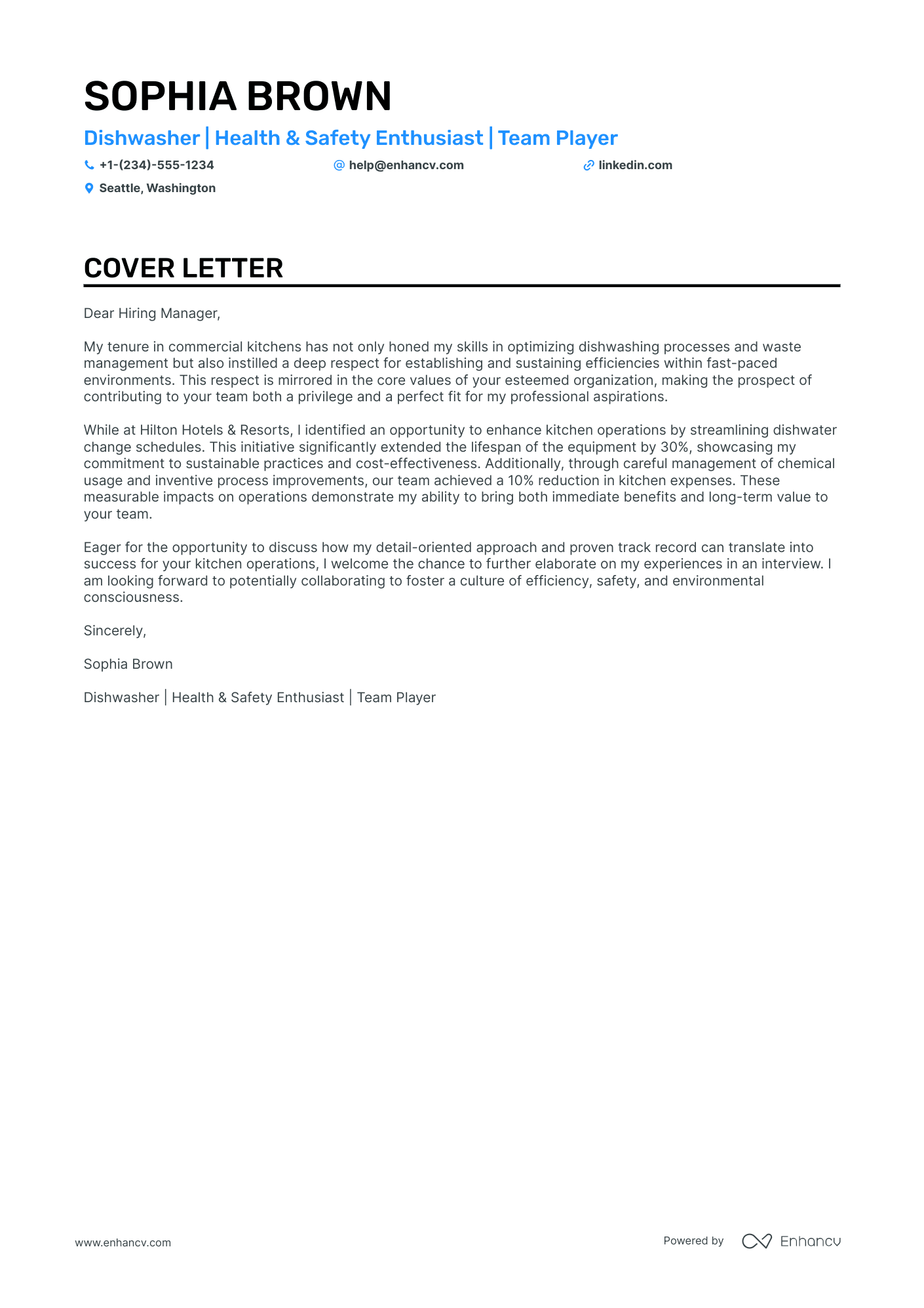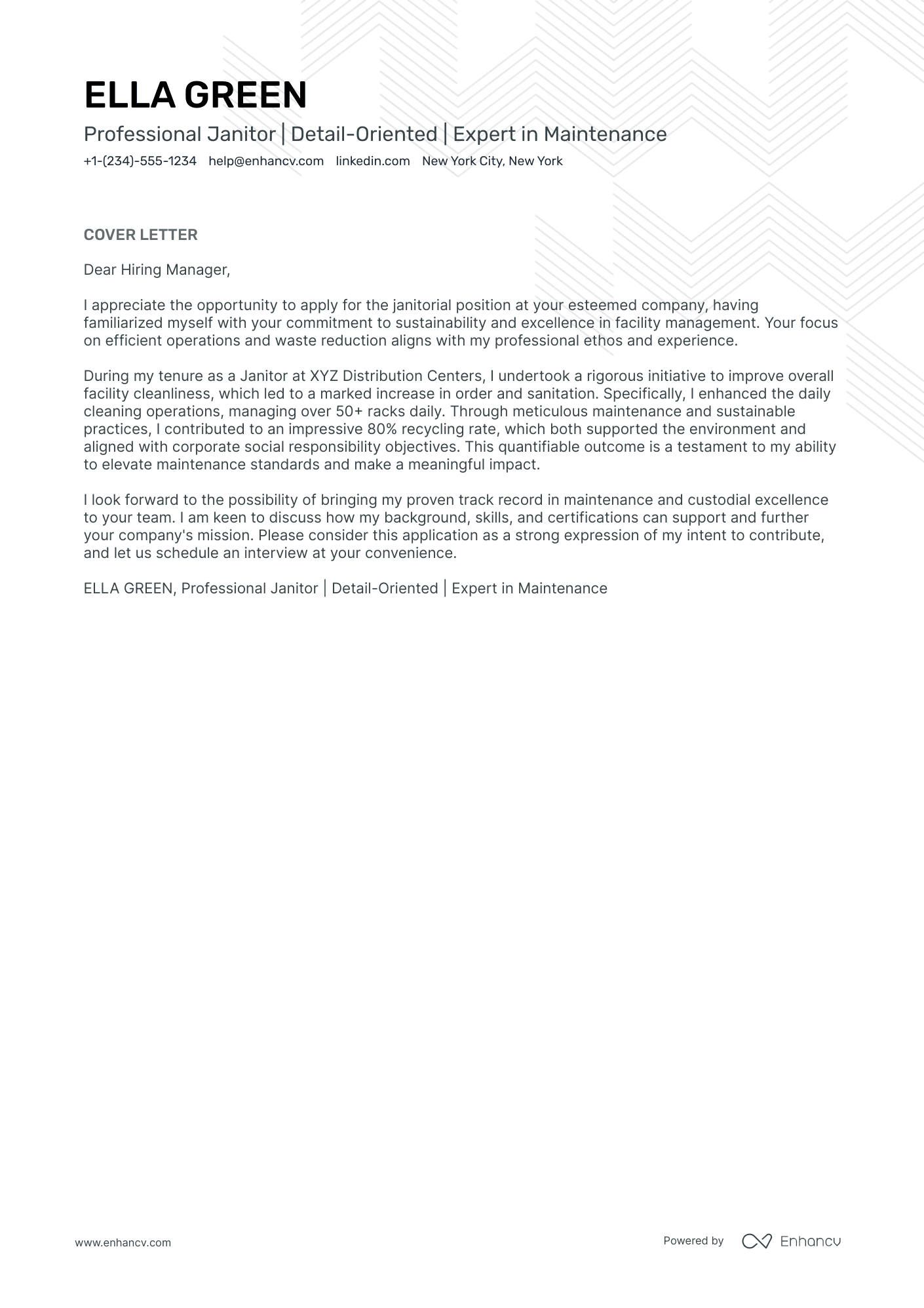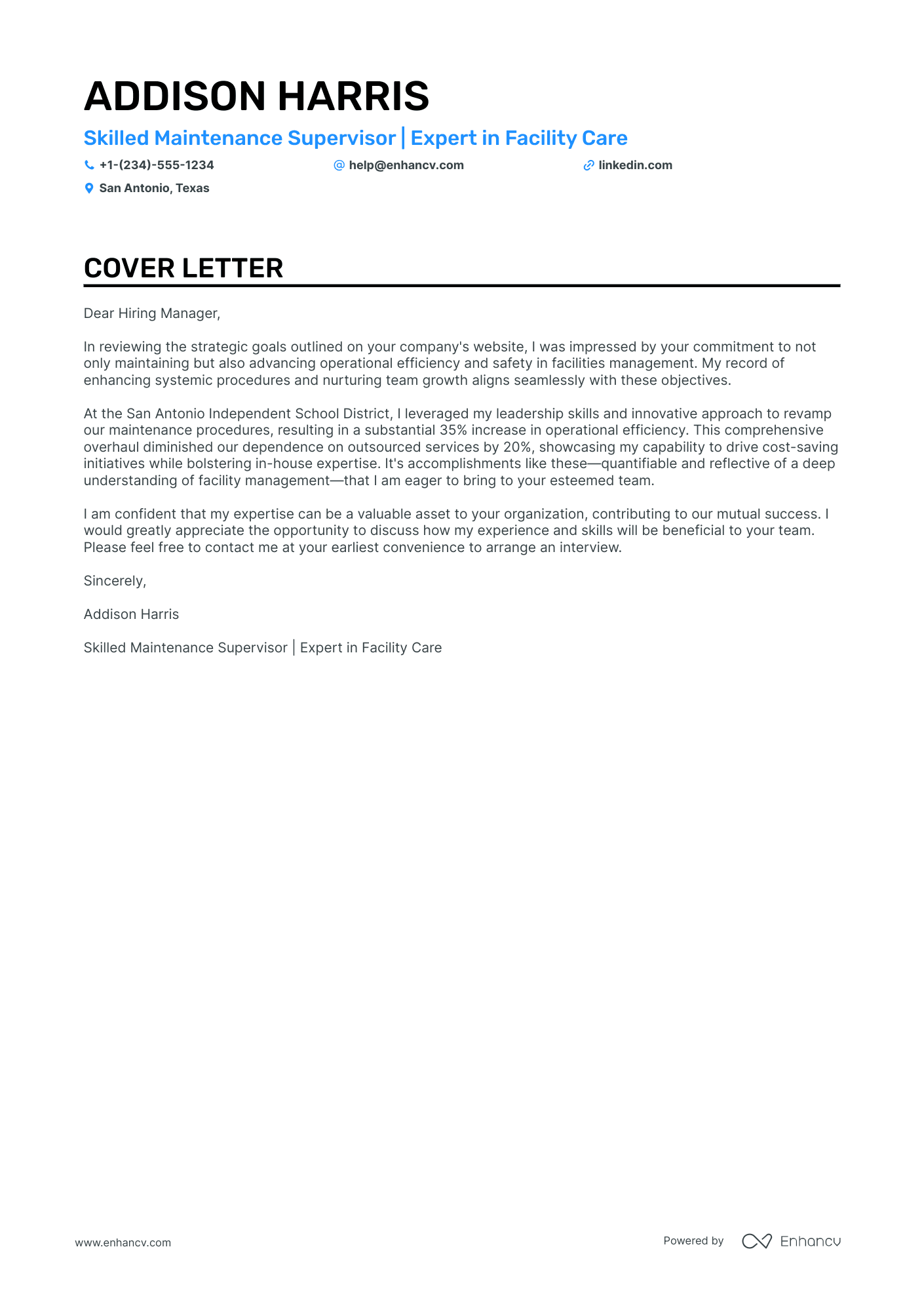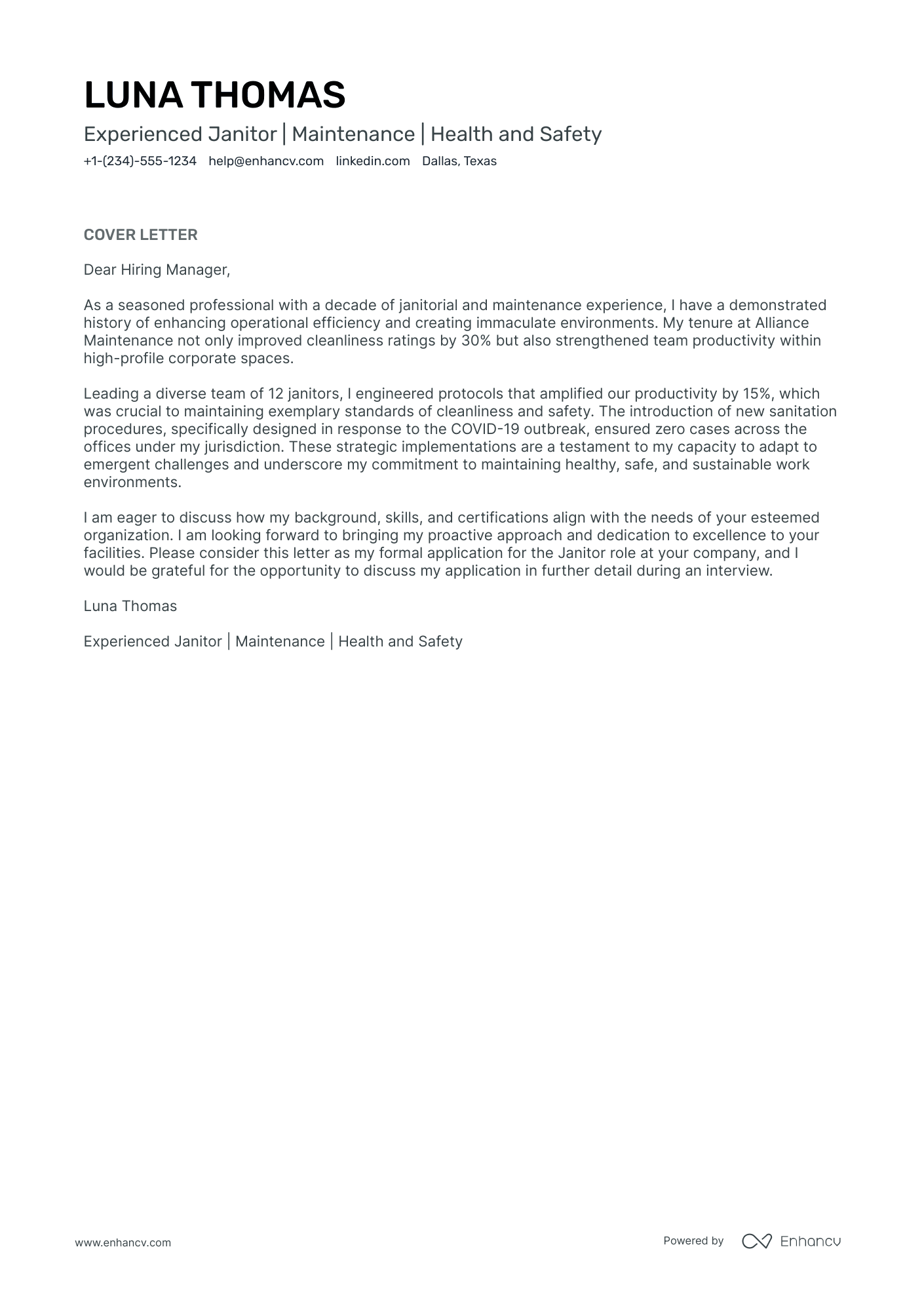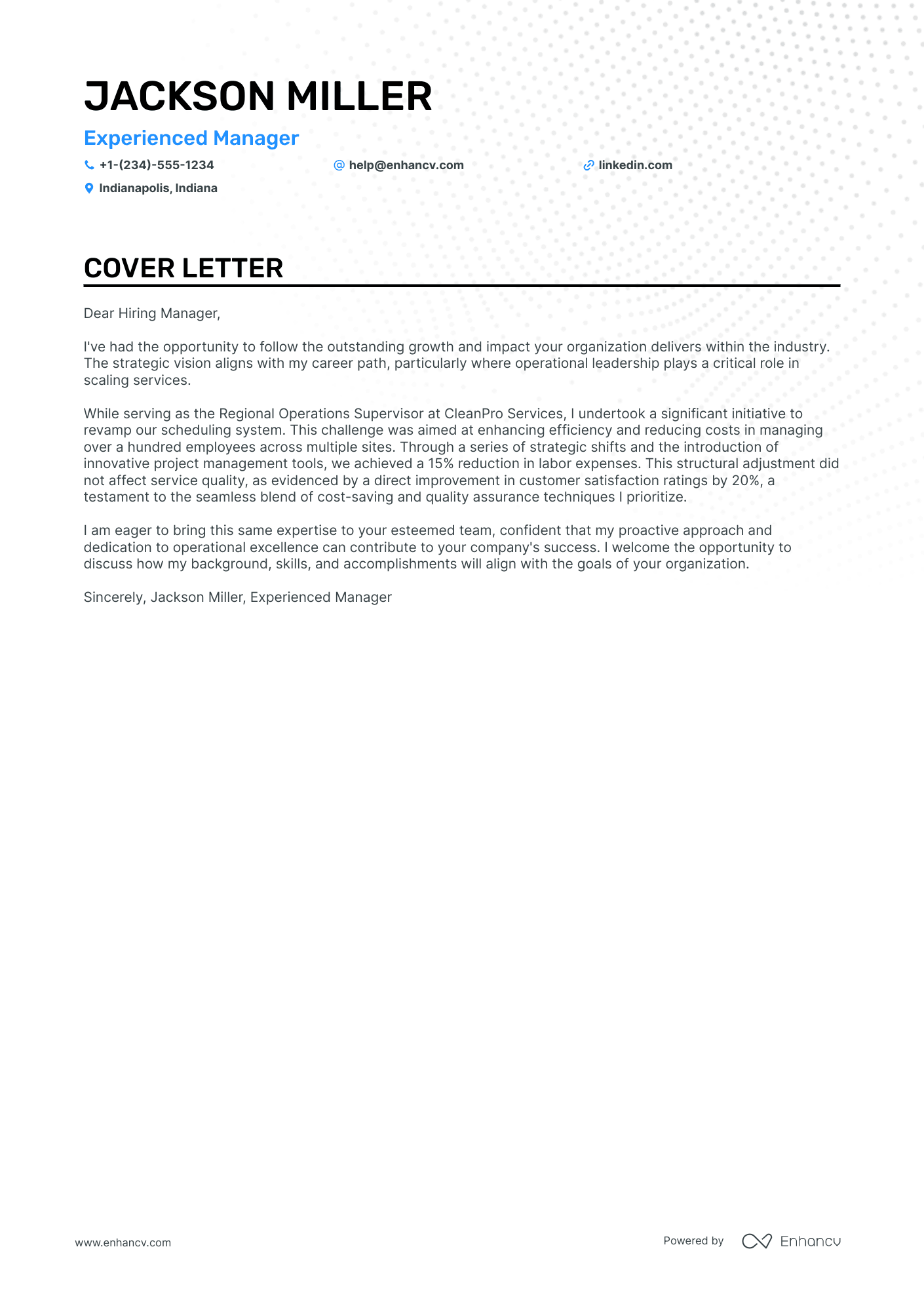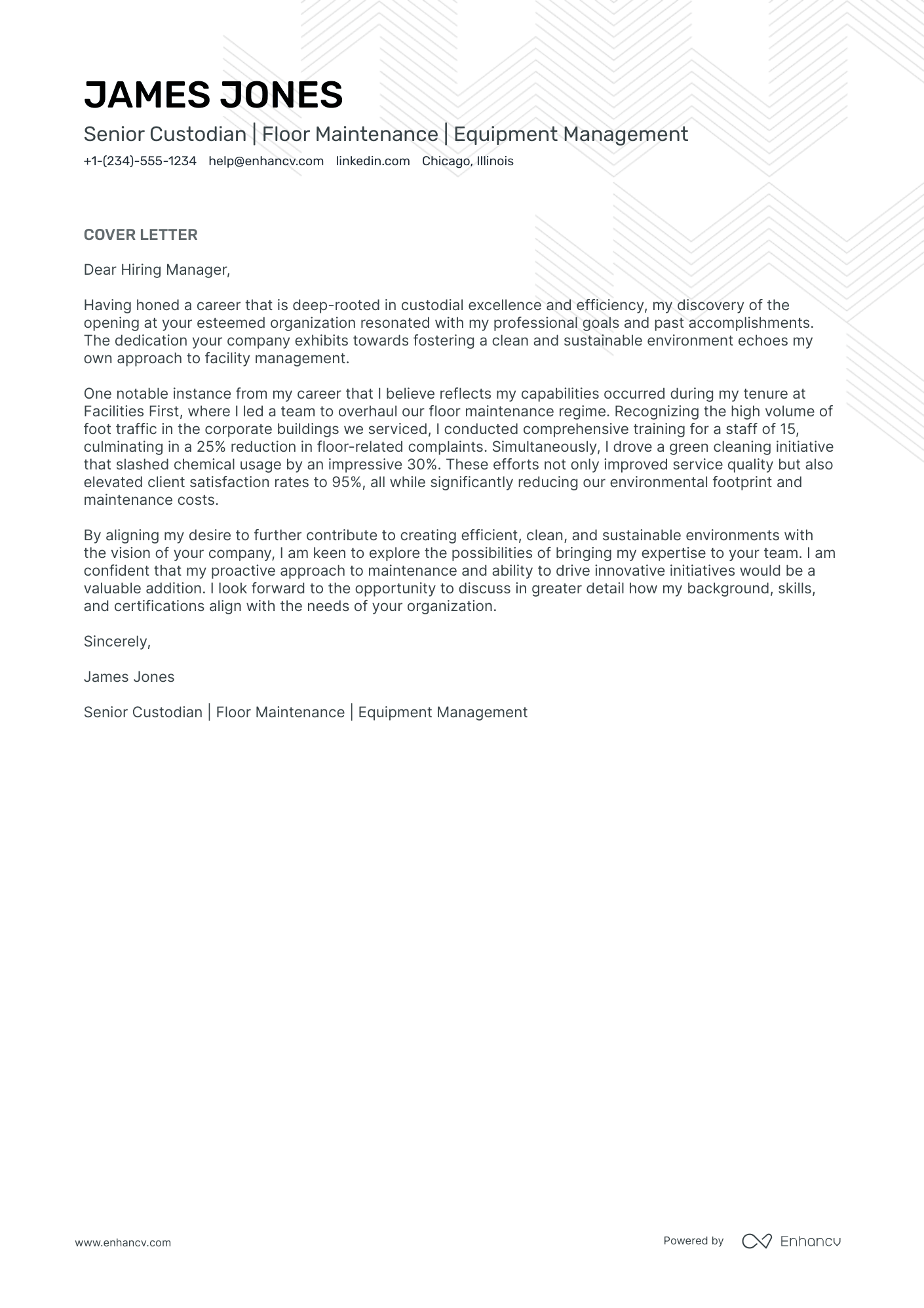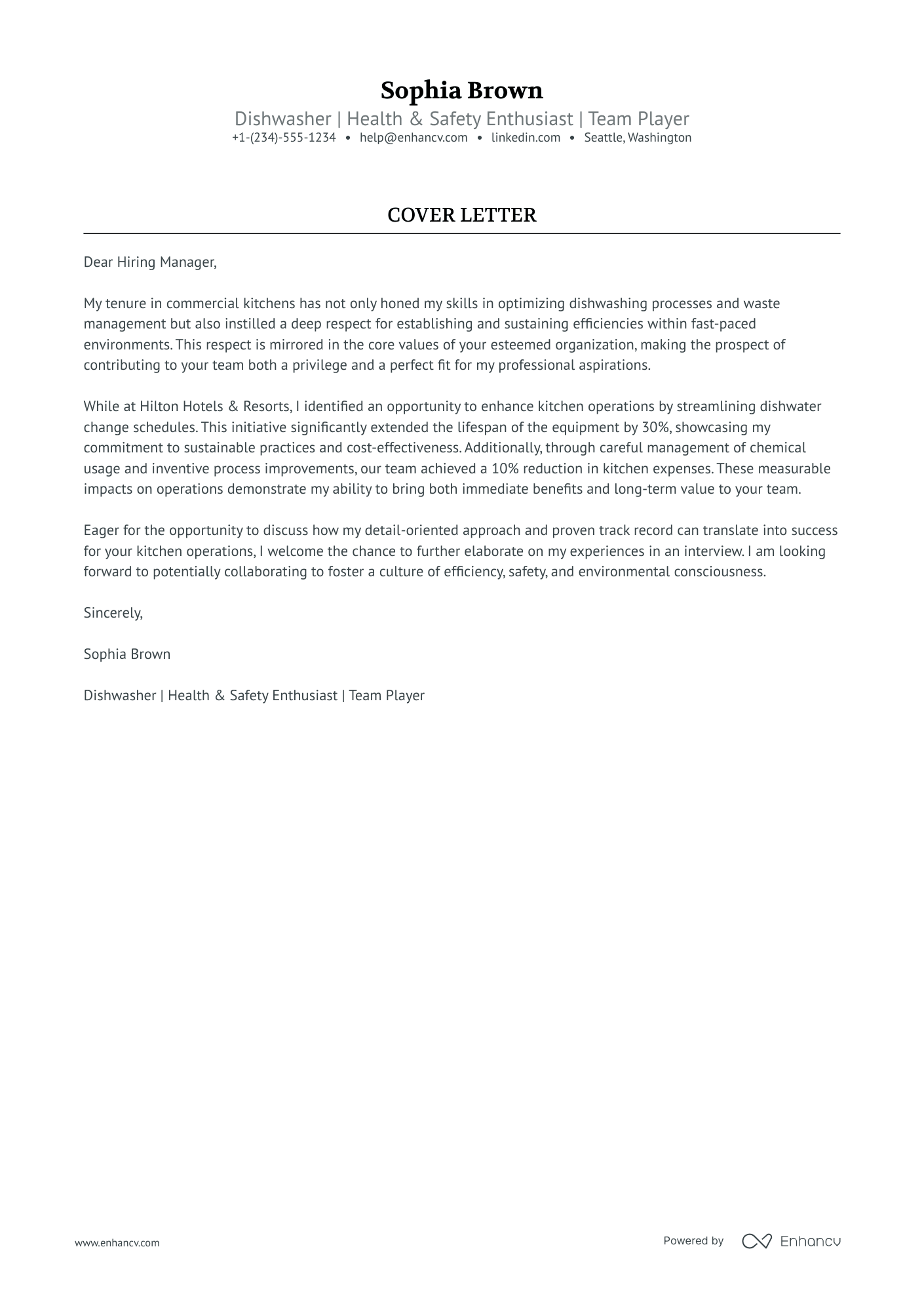As you step into the world of job hunting, you quickly realize that a polished janitor cover letter is essential alongside your resume. Crafting a cover letter can be tricky; it's not just a repeat of your resume, but a chance to highlight a significant accomplishment that you're truly proud of, weaving a narrative of success. Keep it formal yet fresh, avoiding overused phrases that recruiters have seen time and again. Remember, brevity is key—your compelling story must fit on one succinct page.
- Including all the must-have paragraphs in your structure for an excellent first impression;
- Learning how to write individual sections from industry-leading cover letter examples;
- Selecting the best accomplishment to tell an interesting and authority-building professional story;
- Introducing your profile with personality, while meeting industry standards.
And, if you want to save some time, drag and drop your janitor resume into Enhancv's AI, which will assess your profile and write your job-winning cover letter for you.
If the janitor isn't exactly the one you're looking for we have a plethora of cover letter examples for jobs like this one:
- Janitor resume guide and example
- Custodian cover letter example
- Pest Control cover letter example
- Hotel Housekeeping cover letter example
- Maintenance Manager cover letter example
- Journeyman Electrician cover letter example
- Maintenance Technician cover letter example
- Resident Assistant cover letter example
- Landscaping cover letter example
- Hospital Housekeeping cover letter example
- Regional Property Manager cover letter example
Drop your resume here or choose a file.
PDF & DOCX only. Max 2MB file size.
Janitor cover letter example
Sebastian Martin
New York City, New York
+1-(234)-555-1234
help@enhancv.com
- Highlighting quantifiable achievements, such as leading a significant renovation project and delivering it under budget and ahead of schedule, showcases the ability to manage complex projects with financial acumen and time management skills, which are critical for a Facility Manager role.
- Emphasizing strategic project management skills and proficiency in vendor negotiations as part of previous experience demonstrates a strong understanding of essential duties in facility management, such as cost control and working with external contractors effectively.
- Expressing alignment with the company's values, such as a commitment to sustainability and operational efficiency, indicates a cultural fit and understanding of the organization’s priorities, an important aspect when hiring for a role that impacts the company's long-term operations.
Structuring and formatting your janitor cover letter
Here's what the structure of your janitor cover letter should include:
- Header (with your name, the position you're applying for, and the date);
- Salutation (or greeting);
- Introductory paragraph (or your opening statement);
- Body paragraph (or further proof of your experience);
- Closing paragraph (with a call to action);
- Signature (that is optional).
Use the same font for your janitor resume and cover letter - modern fonts like Lato and Rubik would help you stand out.
Your janitor cover letter should be single-spaced and have a one-inch margins - this format is automatically set up in our cover letter templates and our cover letter builder.
When submitting your cover letter, always ensure it's in PDF, as this format keeps the information intact (and the quality of your document stays the same).
On one final note - the Applicant Tracker System (ATS or the software that is sometimes used to initially assess your application) won't read your janitor cover letter.
Need a cover letter, but short on time? Use our free cover letter generator to create one from your resume in no time.
The top sections on a janitor cover letter
- Header: Include your name, address, contact information, and date to ensure the hiring manager knows who you are and how to reach you.
- Salutation: Use a proper greeting such as "Dear Hiring Manager" to show professionalism and respect towards the person reviewing your application.
- Introduction: Briefly state your interest in the janitorial position and mention how you became aware of the job opening to provide context for your application.
- Body: Highlight your previous janitorial or cleaning experience, specific skills (such as knowledge of cleaning chemicals, equipment operation, or adherence to safety guidelines), and your work ethic to demonstrate your ability to perform the job successfully.
- Closing: Express your enthusiasm for the opportunity to contribute to the company's maintenance goals and provide a call to action, inviting the hiring manager to contact you for an interview, while thanking them for their consideration.
Key qualities recruiters search for in a candidate’s cover letter
- Strong attention to detail: Ensures that all areas are cleaned thoroughly, maintaining high standards of cleanliness and sanitation.
- Physical stamina and ability: Capable of performing labor-intensive tasks over long periods, handling heavy cleaning equipment and supplies.
- Reliability and punctuality: Essential for maintaining the cleaning schedule and ensuring spaces are ready for use when needed.
- Ability to work independently: Often required to complete tasks without direct supervision, requiring self-motivation and good time management.
- Flexibility in working hours: Willingness to work early mornings, late nights, or weekends as cleaning schedules can vary and sometimes involve working outside of standard office hours.
- Knowledge of cleaning chemicals and equipment: Understanding of the proper use and safety protocols for various cleaning agents and machinery to ensure safety and effectiveness.
The janitor cover letter salutation: how to address hiring managers
After covering the format of your janitor cover letter, let's look at the salutation.
Back in the day, the cordial "To whom it may concern" or "Dear Sir/Madam", might have worked out fine.
But, nowadays, your cover letter should approach hiring managers on a more personal basis.
So, what to do about your cover letter salutation?
If you've messaged the recruiters and are on a first name basis or a more formal one, use the hiring manager's name in the greeting (e.g. "Dear Sophie," "Dear Ms. Givens", or "Dear Mr. Everett,").
Always aim to make the effort to find out the name of the hiring manager, who'd be assessing your application. Search on LinkedIn, double-check the advert on the corporate website, or message the brand on social media to find out more about the role.
If you can't find the hiring manager's name (and still want to sound professional), use "Dear HR Team,", "Dear Hiring Manager,", or the likes.
List of salutations you can use
- Dear Hiring Manager,
- Dear [Company Name] Team,
- Dear [Mr./Ms./Dr.] [Last Name],
- Dear Search Committee,
- Dear Talent Acquisition Team,
- Dear Human Resources Director,
The janitor cover letter intro: aligning your interest with the company culture
You only have one chance at making a memorable first impression on recruiters with your janitor cover letter.
Structure your introduction to be precise and to include no more than two sentences.
Here are some ideas on how to write a job-winning janitor cover letter introduction:
- get creative - show off your personality from the get-go (if this aligns with the company culture);
- focus on your motivation - be specific when you say what gets you excited about this opportunity.
Storytelling in the middle (or body) of your janitor cover letter
You've got your whole resume sorted, detailing your achievements and skills. What else can you write in your janitor cover letter?
For starters, take the time to re-assess the job requirements and re-discover the most crucial skills and requirements (or keywords).
After making a list of these important keywords, look back on your experience to select just one of your past accomplishments.
Choose the achievement that is the most noteworthy, relevant to the role, and matches the required skills.
Use the next between three and six paragraphs to narrate how:
- you've grown your skill set, thanks to your achievement;
- you'd use the know-how you've gained in your new role;
- your accomplishment could help your potential employers grow.
Remember that recruiters don't need a retelling of your whole resume, but want to find out what makes you, you.
A sincere and original way to end your janitor cover letter
When writing their janitor cover letter, candidates tend to use one of these phrases, "Sincerely yours" or "I look forward to hearing from you".
Both statements show good manners, but your cover letter should end in a more actionable manner.
Write about:
- how you see yourself growing in the role/organization;
- the benefits you would bring about (you'd impress even more with tangible metrics);
- the next steps in the process (provide your availability for interviews).
No experience janitor cover letter: making the most out of your profile
Candidates who happen to have no professional experience use their janitor cover letter to stand out.
Instead of focusing on a professional achievement, aim to quantify all the relevant, transferrable skills from your life experience.
Once again, the best practice to do so would be to select an accomplishment - from your whole career history.
Another option would be to plan out your career goals and objectives: how do you see yourself growing, as a professional, in the next five years, thanks to this opportunity?
Be precise and concise about your dreams, and align them with the company vision.
Key takeaways
Within this Enhancv guide, we've provided you with plenty of advice and inspiration on writing your janitor cover letter:
- Always make sure your janitor cover letter is tailored to the role you're applying for to make a good impression on recruiters;
- In your janitor cover letter include a header (with your name, the role you're applying for, date, and contact details) and an introduction of up to two sentences that highlight your key accomplishment or why you'd fit the role;
- Focus your janitor cover letter body on one sole achievement through your career and all the valuable lessons, skills, and know-how you've learned (that are relevant to the role);
- Ensure your janitor cover letter closing statement isn't generic and includes either a call to action or a promise;
- If you lack professional experience, shift recruiters' focus to a relevant achievement (thanks to your academic or versatile experience) or toward your dreams and goals for professional growth.
Janitor cover letter examples
By Experience
Entry-Level Janitor
By Role
